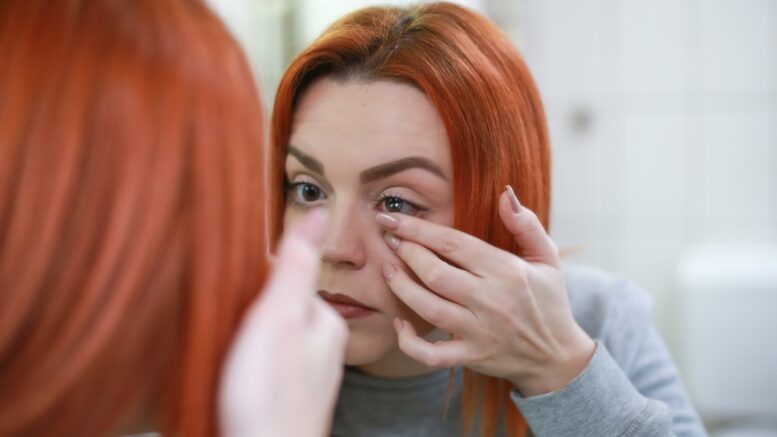Eyeglasses and contact lenses are the two most widely used vision correction solutions that people with poor eyesight opt to see clearer.
However, most adults prefer contacts since these provide a wider field of view and cause fewer vision distortions and obstructions than eyeglasses. They also do not get in the way when you are exercising or playing sports.
Additionally, unlike eyeglasses, contact lenses are not affected by weather conditions and won’t fog up when temperatures are too low.
People with astigmatism can also use contact lenses to correct this vision problem, which is a more convenient and comfortable solution.
Toric contact lenses for astigmatism have different powers in various meridians of the lens to correct this vision issue. This type of lens can help improve nearsightedness and farsightedness as well.
All these advantages also make contact lenses a more favorable option for teens in need of a vision correction solution.
At What Age Can Children Begin Wearing Contact Lenses?
A study has shown that children from age 8 onward could wear and care for their contact lenses. As such, contacts are great options for teens who need to correct their vision problems.
However, as a parent, your main concern should be knowing if your teen is ready for the responsibilities of wearing contact lenses.

But what makes a teen ready for contact lens use? Consider these factors:
Hygiene habits
Following the right hygiene practices is crucial for people who wear contact lenses. Handling contacts with dirty hands is a surefire way of getting eye infections and other conditions.
If your teen is asking you if they can wear contact lenses, observe their personal hygiene habits first. Check how many times they wash their hands throughout the day and if they do so after going to the bathroom and before and after eating.
Observe how thorough they are in washing their hands as well.
If you are satisfied with their personal hygiene habits, you can consider this a sign that they can be responsible and safe contact lens wearers.
However, you still have to explain to your child that it is crucial they continue these practices after they start wearing contact lenses.
Care for their personal belongings
Your teen also needs to be responsible for handling and taking care of their contact lens. If not, they will probably damage or lose their vision correction device.
If your teen opts for monthly contacts, they have to make it a point to put the lenses in their case with the right amount of new solution every night. If they are wearing daily disposable lenses, they have to throw them away once removed..
Your teen should also make it a habit to check their lenses before putting them on to avoid wearing damaged ones, which can injure their eyes.
If your teen takes care of their possessions properly, you can get an assurance that they will be responsible enough to look after their contact lens properly.
Ability to follow instructions
Contact lens overuse is another common cause of eye infection. Because of this, adherence to the product’s recommended wear time is also crucial.
Your teen should be able to follow the recommended wearing schedule and instructions.. They need to note when they started wearing their newest pair of weekly or monthly contact lenses and when to replace them.
Also, your teen should never go to sleep with their contacts since they can deprive the eyes of oxygen, which can cause corneal damage.
If your child can follow instructions, you can take it as a good sign that they are ready for contact lens use.

What Are the Best Options for Teens Trying Contacts for the First Time?
For teens, many eye care professionals recommend they start wearing daily contact lenses.
Daily disposable contact lenses are worn only once, then thrown away after a day of wear. Because of this, there is no risk that your teen will forget to replace them at the right time.
However, this is only a general recommendation. It is still best to have an eye care specialist check your child’s vision to determine which type of contact lens would suit them better, especially if they frequently use devices for their school work and after-school activities.
What Does Your Teen Need to Get Their First Pair of Contact Lenses?
Since contact lenses are medical devices, they should not be bought and worn without a prescription.
Bringing your child to an eye care practitioner before getting them their first contact lenses is always a good idea. The specialist will check your teen’s vision and provide a prescription for the right power , type, and brand of lenses suitable for their requirements.
Keep in mind that it is crucial that your teen wears contact lenses properly fitted to their eyes. If not, these medical devices can cause more harm than good for your child.
What Important Contact Lens Care Tips Should You Share With Your Teen?
Below are some of the vital contact lens care and handling tips your teen should always remember when they start wearing these medical devices:
- Always handle or touch contact lenses with clean hands and utmost care.
- Remove contact lenses before going to bed and store them in their container with the recommended solution.
- Replace contact lens cases regularly, at least every three months as per the American Optometric Association.
- Never use water to rinse and soak contact lenses.
- Avoid taking a bath and swimming while wearing contacts.
- Do not share contact lenses with others since it can cause infections.
- Check the lenses before inserting them and if there are rips or tears, throw them immediately since they can scratch the eyes.
- Replace contact lenses daily, weekly, or monthly, based on the schedule.
- Avoid wearing lenses that are beyond the recommended period.
- Remind your teen to tell you immediately if they experience any symptoms of eye infections, such as redness, itchiness, pain, or light sensitivity.
If they have any of these symptoms, bring them to their eye doctor immediately, even if these signs come and go.
Since contact lenses are more comfortable and convenient to wear, your teen will probably choose them over eyeglasses. With their eye care specialist’s help and your guidance, they will have better, clearer vision and stay safe at the same time.
